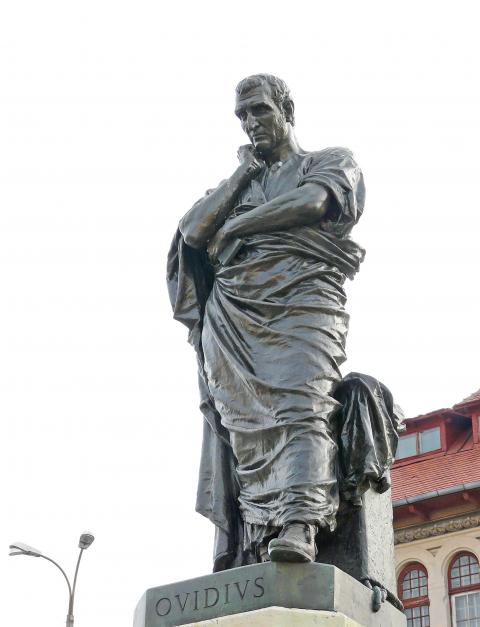Two thousand years after being banished from Rome, Ovid has been rehabilitated in a victory for the famous poet whose cheek riled one of history’s most powerful emperors.
Rome council unanimously approved a motion to “repair the serious wrong” suffered by Ovid, best known for his Metamorphoses and Ars Amatoria, or “Art of Love,” who was exiled by the Emperor Augustus to Romania in the year 8 AD.
The reason for his banishment to the town of Tomis on the Black Sea coast is one of literature’s biggest mysteries, as there are no surviving contemporary sources which give details about it, so all historians have is Ovid’s word.

Photo courtesy of Wikimedia commons
The poet rather cryptically claims it was due to carmen et error or “a poem and a mistake” — the poem being the Ars Amatoria, a subversively witty poem instructing men how to get and keep a girlfriend.
Augustus is assumed to have been less than pleased, having recently passed a series of laws against adultery.
SCANDAL IN THE SENATE

Photo courtesy of Wikimedia commons
“Although the poem doesn’t overtly advocate adultery, it sails quite close to the wind,” Rebecca Armstrong, a Fellow in Classics at Oxford University, says.
“It definitely displays an irreverent tone towards traditional moral attitudes as well as the emperor and his family.
“For example, Ovid recommends several of the public monuments built by Augustus and his family as excellent spots to pick up girls,” she said.
It is unlikely to have been the poem alone that angered Augustus enough to drive Ovid out, as it was published several years before he was sent away.
But after irritating the emperor, experts believe the poet’s mysterious “error” was the last straw.
“It’s quite often suggested that it might have been something to do with the scandal surrounding Augustus’s granddaughter, Julia, who was exiled in 8 AD for an adulterous affair with a Roman senator,” Armstrong said.
The writer hated the “wild frontier” of Tomis and pleaded endlessly to be allowed to return to Rome — to no avail.
FROM SHAKESPEARE TO DYLAN
He did not help himself by partly apologizing for the Ars Amatoria in the poem Tristia II, but “making it clear that he believes Augustus to be an unsophisticated reader of poetry and someone who can’t take a joke.”
“An interesting strategy for someone hoping to be recalled,” Armstrong said.
The decision to revoke Ovid’s exile comes on the 2,000th anniversary of the poet’s death in 17 AD. It was approved this past Thursday in the presence of officials from the poet’s hometown of Sulmona in central Italy.
Rome said it had restored “the freedom and dignity” of a man who had “inspired writers of caliber such as Dante, Boccaccio, Shakespeare, Joyce, Kafka and Pope, as well as modern artists such as Bob Dylan”.
Ovid is not the only famous figure to whom Italy has recently apologized: In 2008 Florence asked forgiveness for persecuting the poet Dante, who fled into exile after he was sentenced to death for his political beliefs.
Armstrong said she thought Ovid “would have been pleased” by the ruling, particularly “by the knowledge that people care who he was and are still reading his poetry so many years later”.
And not only has his jocular guide to dating been avenged, he may also have pulled one of the biggest pranks in history.
Most critics are dubious, but “on the basis that there is so little evidence available, some have even argued that Ovid was never exiled at all, and that his exile poetry is, rather, a kind of experimental literature.”

On April 26, The Lancet published a letter from two doctors at Taichung-based China Medical University Hospital (CMUH) warning that “Taiwan’s Health Care System is on the Brink of Collapse.” The authors said that “Years of policy inaction and mismanagement of resources have led to the National Health Insurance system operating under unsustainable conditions.” The pushback was immediate. Errors in the paper were quickly identified and publicized, to discredit the authors (the hospital apologized). CNA reported that CMUH said the letter described Taiwan in 2021 as having 62 nurses per 10,000 people, when the correct number was 78 nurses per 10,000

As we live longer, our risk of cognitive impairment is increasing. How can we delay the onset of symptoms? Do we have to give up every indulgence or can small changes make a difference? We asked neurologists for tips on how to keep our brains healthy for life. TAKE CARE OF YOUR HEALTH “All of the sensible things that apply to bodily health apply to brain health,” says Suzanne O’Sullivan, a consultant in neurology at the National Hospital for Neurology and Neurosurgery in London, and the author of The Age of Diagnosis. “When you’re 20, you can get away with absolute

May 5 to May 11 What started out as friction between Taiwanese students at Taichung First High School and a Japanese head cook escalated dramatically over the first two weeks of May 1927. It began on April 30 when the cook’s wife knew that lotus starch used in that night’s dinner had rat feces in it, but failed to inform staff until the meal was already prepared. The students believed that her silence was intentional, and filed a complaint. The school’s Japanese administrators sided with the cook’s family, dismissing the students as troublemakers and clamping down on their freedoms — with

As Donald Trump’s executive order in March led to the shuttering of Voice of America (VOA) — the global broadcaster whose roots date back to the fight against Nazi propaganda — he quickly attracted support from figures not used to aligning themselves with any US administration. Trump had ordered the US Agency for Global Media, the federal agency that funds VOA and other groups promoting independent journalism overseas, to be “eliminated to the maximum extent consistent with applicable law.” The decision suddenly halted programming in 49 languages to more than 425 million people. In Moscow, Margarita Simonyan, the hardline editor-in-chief of the